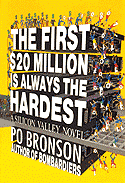 There’s a marvelous game embedded in Po Bronson‘s excellent 1997 book The First $20 Million Is Always the Hardest: A Silicon Valley Novel. The game’s free and you can play it almost anywhere. It’s called “Ten Women.”
There’s a marvelous game embedded in Po Bronson‘s excellent 1997 book The First $20 Million Is Always the Hardest: A Silicon Valley Novel. The game’s free and you can play it almost anywhere. It’s called “Ten Women.”
The first time you hear the rules, the game sounds like a sexist piece of politically incorrect frat-boy mischief — and, okay, there is an element of that. But once you’ve played a handful of times, you realize that this game isn’t really about sex at all; it’s a potent way to examine how we make choices and deal with opportunities.
Here are the basic rules for “Ten Women”. (Or, at least, here’s how I remember and play the game.)
- Sit or stand in a public place where there’s plenty of pedestrian traffic. Mall, airport, movie theater, baseball stadium, it doesn’t matter.
- Take a careful look at the next ten women who walk by, one at a time.
- As each woman passes, you must decide right then and there whether that’s the one woman out of the ten you get to go to bed with.
- Once that woman has passed you by, you can no longer choose her. You’ve lost the opportunity forever.
- If you pass on the ninth woman, then you’re stuck with the tenth, no matter how unattractive she might be (by whatever standards you use to judge that).
Sounds juvenile, right? Sounds sexist? Indulge me here. Keep reading.
“Ten Women” is about women in the same way that blackjack is about laminated pieces of paper with pictures and numbers on them. It’s really about taking risks and making gambles. It’s about learning to make quick decisions and not regretting your mistakes. The people — like the cards — are just tokens.
Still think the game is sexist or objectifying? Then think about this: imagine these ten women are ten stocks you might buy. Or ten colleges you might enroll in. Or ten potential employees you might hire. Ten properties you might buy. Ten potential spouses. (Did you make the right choice marrying your teenage sweetheart, or should you have waited to see if someone more compatible came along…?)
Make your choice, and make it now. Remember, you can’t change your mind. Time marches on, opportunities disappear. You can’t unchoose.
 But finding myself in need of a major distraction a few weeks ago, I gave in and picked up a copy. Armed with the latest
But finding myself in need of a major distraction a few weeks ago, I gave in and picked up a copy. Armed with the latest